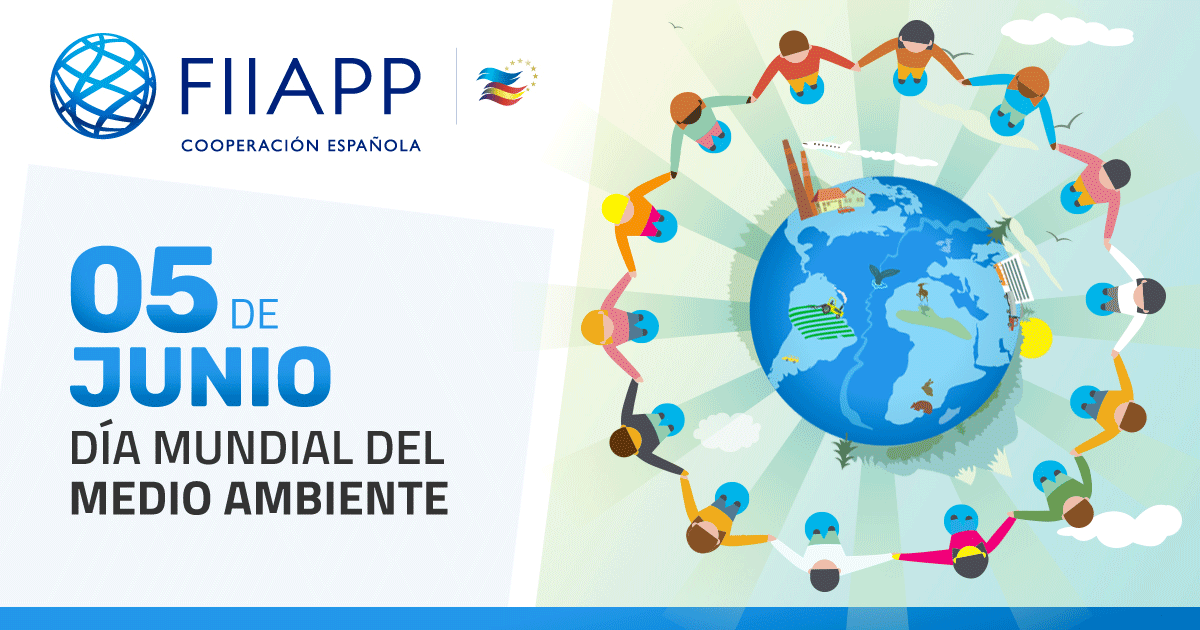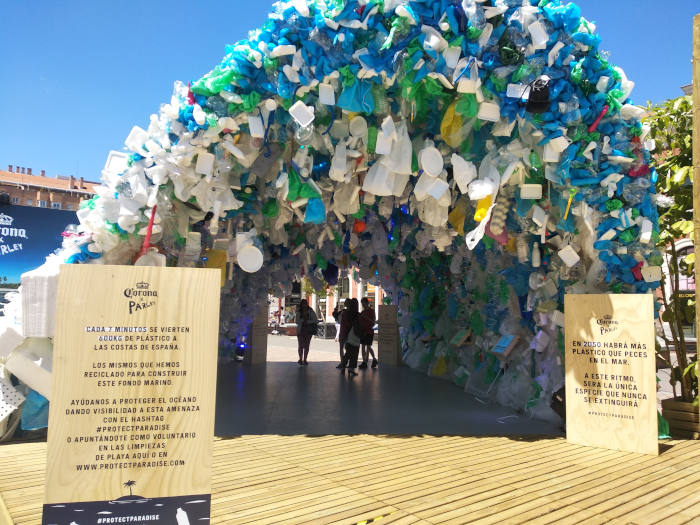-
27 June 2019
Category : Reportage
Protect the environment, an obligation on all of us
On the occasion of World Environment Day, celebrated on 5 June, and World Oceans Day, commemorated on 8 June, we highlight the situation and the consequences environmental pollution is currently having and how FIIAPP, through various projects it manages, is helping in the fight to protect the environment

According to the World Health Organization (WHO), environmental pollution has reached alarming proportions, in figures, 9 out of 10 people breathe toxic air and 7 million die every year from environmental and domestic pollution.
The Director General of the WHO, Tedros Adhanom Ghebreyesus, points out that “air pollution poses a threat to everyone, although the poorest and most marginalised people are worst affected”. In this regard, the WHO notes that over 90% of deaths related to air pollution occur in low and middle income countries, mainly in Asia and Africa, followed by low and middle income countries in the Eastern Mediterranean Region, Europe and the Americas.
Air pollution is considered an important risk factor, especially for noncommunicable diseases. The data show that it causes a quarter (24%) of adult deaths from heart disease, 25% of deaths from strokes, 43% of deaths from chronic obstructive pulmonary disease and 29% of deaths due to lung cancer.
Also, according to a study published in the ‘European Heart Journal‘, pollution is responsible for 800,000 deaths a year in Europe and 8.8 million worldwide.
World Environment Day
The first conference related to environmental issues was held in Stockholm from 5 to 16 June 1972 under the auspices of the United Nations. This meeting is known as the Conference on the Human Environment and its objective was to achieve a common vision on basic aspects related to protecting and improving the human environment.
On 15 December 1972, the General Assembly adopted a resolution that designated 5 June as World Environment Day. In addition, on that same day, the General Assembly approved another resolution that led to the creation of the United Nations Environment Program (UNEP).
In 2019, World Environment Day has focused on air pollution. “It’s time to act forcefully. My message to governments is clear: tax pollution, stop subsidising fossil fuels and stop building new coal plants. We need a green economy, not a grey economy, “the Secretary General of the United Nations, Antonio Guterres, highlighted in his speech.
SDG 13: Adopt urgent measures to combat climate change and its effects
In order to strengthen the global response to the threat of climate change, countries adopted the Paris Agreement at COP21, which entered into force in 2016. In it, the countries committed themselves to work to limit the increase in global temperature to less than two degrees Celsius.
The targets that are intended to achieve this Sustainable Development Goal include: strengthen the resilience and ability to adapt to the risks related to climate and natural disasters; improve education and awareness of climate change mitigation; put the Green Climate Fund into operation by capitalising on it as soon as possible and increase capacity for effective planning and management in relation to climate change in the least developed countries.
World Oceans Day
The United Nations General Assembly designated 8 June as World Oceans Day. The oceans cover more than 70% of the Earth’s surface. However, only 1% of this area is protected. In addition, the oceans contain 96% of the Earth’s water and absorb around 25% of the CO2 that is added to the atmosphere year after year due to human activity, thus reducing the impact of this greenhouse gas on the climate.
“In the last 150 years, approximately half of live corals have been lost. Pollution by plastic in the oceans has multiplied tenfold in the last 40 years. One third of fish stocks are overexploited. The dead zones – submarine deserts where life does not prosper due to a lack of oxygen – are increasing rapidly, both in size and in number, “said Antonio Guterres.
SDG 14: Oceans, Seas and Marine Resources
The Oceans Conference was held between 5 and 9 June 2017, it was the first United Nations conference to work towards achieving SDG 14, its objective was to conserve and sustainably use the oceans, seas and marine resources through sustainable development.

Recreation of kilos of plastics in the oceans, made by Corona x Parley in Madrid In addition, this Sustainable Development Goal has a number of targets including the following: prevent and reduce marine pollution of all kinds; regulate fishing exploitation and end overfishing, illegal, unreported and unregulated fishing and destructive fishing practices; conserve at least 10% of coastal and marine areas in accordance with national laws and international law; and facilitate the access by small-scale artisanal fishermen to marine resources and markets.
At present, various brands are reflecting the problem that our seas currently suffer in their advertising campaigns. For example, the Reina Sofía Foundation has presented an animated short film, Lemon, which represents the problem of plastics in nature.
According to scientists, by 2050 there will be more plastic than fish in the sea. They also warn that one million seabirds and 100,000 marine mammals die each year as a result of plastic contamination. And, as if that were not enough, they highlight that microplastics have been found in 70% of the salt, molluscs and crustaceans we consume in our country.
FIIAPP and its contribution to the environment
FIIAPP manages several projects focused on caring for the environment. The EUROCLIMA+ programme is funded by the European Union and the climate governance component is managed by FIIAPP. It aims to promote environmentally sustainable and climate-resilient development in 18 Latin American countries, because greenhouse gas emissions from urban transport in the region continue to increase.
If we talk about climate change, Beatriz García-Pozuelo, EUROCLIMA+ senior technician, points out that “it is expected that by 2100 the temperature in Madrid will have increased by 4 ºC. This means that living in Madrid would be more like living in Saudi Arabia or the Arab Emirates.”
In addition, FIIAPP manages Cuba-renewable, a project to promote renewable energy sources and energy efficiency in Cuba. This project supports the effective implementation of the policy for the prospective development of renewable energy sources and efficient energy use and an appropriate regulatory framework.
“The use of renewable energy has created mountain hospitals, rural schools and, ultimately, allowed the population to access energy in a more equitable manner,” says Maite Jaramillo, coordinator of the Cuba-Renovables project. In addition, she points out that, as Cuba is a country rich in renewable resources, the development of these resources “would make an important contribution to the environment”.
In addition, the Assistance Programme against Transnational Organised Crime, El PAcCTO, is implementing various activities among security forces and bodies in Europe, Latin America and internationally in order to promote joint policies to combat environmental crimes.
Similarly, the project ‘Accountability, Rule of Law and Anti-Corruption in Ghana’, ARAP-Ghana, whose representatives at Ghanian Public Prosecutor’s Office and Environmental Protection Agency have visited Spain in order to acquire knowledge and good practices in the field of environmental crimes.
The views and opinions expressed in this blog are the sole responsibility of the person who write them.






